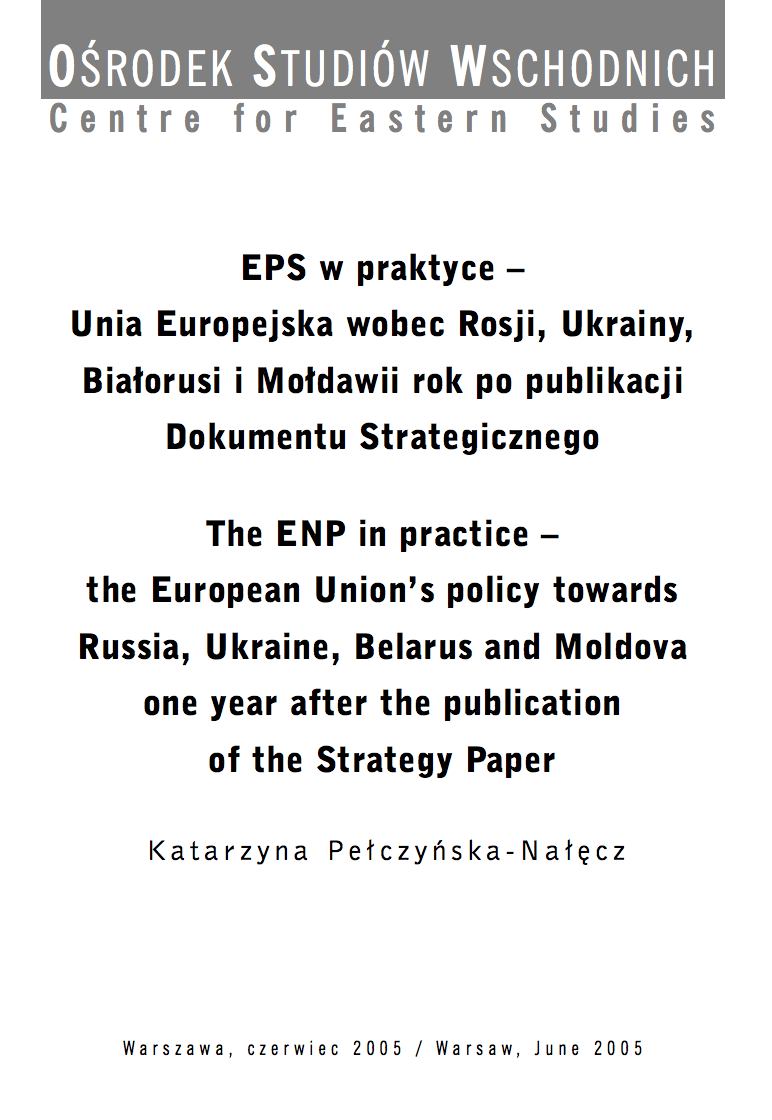The ENP in practice - the European Union's policy towards Russia, Ukraine, Belarus and Moldova one year after the publication of the Strategy Paper
The ENP in practice - the European Union's policy towards Russia, Ukraine, Belarus and Moldova one year after the publication of the Strategy Paper
Author(s): Katarzyna Pełczyńska-Nałęcz
Subject(s): Governance, Economic policy, International relations/trade, Developing nations, EU-Approach / EU-Accession / EU-Development, Geopolitics
Published by: OSW Ośrodek Studiów Wschodnich im. Marka Karpia
Keywords: ENP; Russia; Ukraine; Belarus; Moldova
Summary/Abstract: 1. Clear qualitative changes have taken place in relations between the European Union and its Eastern neighbours over the past year. The European Neighbourhood Policy (ENP) has been playing a significant part in the context of these changes. In the cases of Moldova and Ukraine, which are the countries interested in enhancing co-operation with the EU, the ENP has provided a formula that allows taking steps to implement this objective. The ENP has also contributed to "outlining an alternative" to Belarus' current self-isolation. However, the ENP has first of all given a clear message to Russia by specifying the EU's interests and objectives concerning Eastern Europe. The ENP has clearly stated that the EU wants to build democracy and a free market in those countries, and has signalled that the European Union intends to discuss the issues concerning the countries directly with them, and not through Moscow's offices.2. The main shortcoming of the ENP appears to be the disproportion between the number of commitments and tasks that the neighbours must make and carry out and the benefits promised by the EU. Currently, the ENP does not offer membership prospects, and other concessions made by the European Union have not been clearly defined (neither in terms of the scope nor the terms and conditions of implementation). This lack of balance between the European Union's great aspirations to influence its neighbours and the limited offer it addresses to those neighbours seems to be a problem of such magnitude that, unless the situation changes, it may paralyse further implementation of the ENP. 3. The mechanisms and objectives of the ENP have been determined in rather general terms, which gives the EU great freedom of action in its policy towards the Eastern partners. On the one hand, the ENP allows for a very reserved approach or even the simulation of real actions; yet on the other, it does not exclude the possibility of very active engagement by the EU (including holding out the prospect of membership for the European neighbours). This shows that the ENP does not definitely determine the nature of the EU engagement. A great deal depends on the political will on the part of both the European Union's structures and its individual member states. The ENP's flexibility seems to be a particularly valuable feature; it gives an opportunity for an evolutional change to this formula which may be inspired by both new experiences and the changing reality.
Series: OSW Point of View
- Page Count: 46
- Publication Year: 2005
- Language: English, Polish
- Content File-PDF

